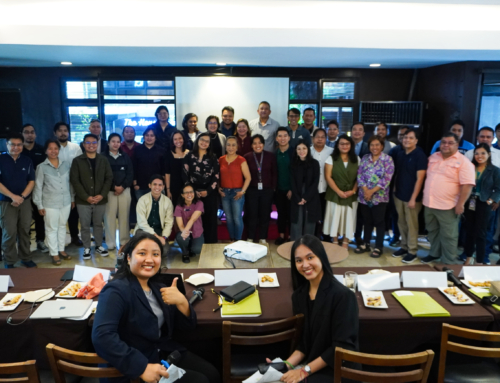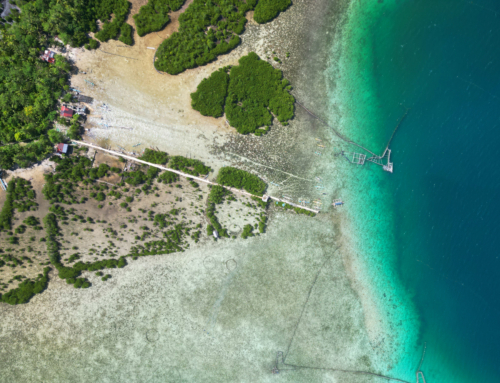Coron, Mandaue, and Guiuan LGUs launch webinar series with Dutch Embassy, ICSC
26 JANUARY 2020, Quezon City — Local government officials shared their efforts to make their communities resilient from both climate change and COVID-19 in today’s launch of a webinar series for the online international Climate Adaptation Summit hosted this year by the Netherlands.
The three-part webinar series, “Climate Change and COVID-19: Adapting to Two New Normals”, is organized by the Embassy of the Netherlands in Manila with the Institute for Climate and Sustainable Cities.
Representatives of the local governments of Coron, Palawan; Mandaue City, Cebu; and Guiuan, Eastern Samar shared how the climate resilience plans and multisectoral networks they have been leading in their respective cities and towns became instrumental in their localities’ response to the pandemic.
“Communities and local governments must have the tools and means to strengthen their resilience and must have a say in how national policy is designed and implemented. Through your work, you have experienced building strong, healthy, and resilient communities. Now, it’s time to share these experiences with other communities in the Philippines and the wider global community through the Climate Adaptation Summit,” said Pieter Terpstra, the Netherlands Embassy in Manila’s Deputy Head of Mission for the Minister for Foreign Trade and Development Cooperation.
Local voices share lessons learned
Engineer Fernando Lopez, disaster risk reduction management officer of Coron, Palawan, shared how he and the other members of the Calamianes Resilience Network, comprised of Coron and four other towns in Northern Palawan, had to roll out their studies and plans without compromising health protocols. Coron’s 10-year local climate plan was approved by their municipal council last June 2020, a few months into the national lockdown. The network also supported the installation of portable handwashing stations and the making of face shields for local frontliners across their island group.
“Our watersheds are vulnerable. We expected supply problems but because tourism was halted because of the lockdown, there was less demand. Still, we needed to act given the water shortage,” Engr. Lopez said, adding that resilience building should not be a mere phrase but must be acted upon.
He also highlighted how indigenous knowledge and community engagement, particularly with the Tagbanua indigenous peoples of Coron, were important in addressing the water problems in their town.
Architect Marlo Ocleasa, head of Mandaue, Cebu’s city planning and development office, agreed that community engagement and empowerment was the “one common denominator in addressing climate change and COVID-19.”
“Our resilience is being tested by the pandemic. It is not enough to survive, but we need to move forward amid these challenges. No amount of planning for development is enough if we cannot plan to be resilient in the first place,” added Architect Araceli Barlam, Head of Mandaue’s city environment and natural resources office.
Both Ocleasa and Barlam are active members of the Mandaue Resilience Network, which led the crafting of the city’s local climate plan and Low Carbon Model Town project. In the wake of the pandemic, the network also launched urban gardening projects, sponsored hygiene kits, and installed interconnected bike lane networks in Mandaue, which aims to be a “green city”. Mandaue City, Lapu-Lapu City, and Cebu City also strengthened their tri-city transportation plan.
“The city’s adaptation framework focuses on two main strategies: building a resilient community and ensuring food and water security. We cannot do this alone. We need to collaborate with our neighboring cities in addressing climate change and the pandemic,” Ocleasa said.
Rectito Melquiades, secretary to the Sangguniang Bayan in the easternmost town of Guiuan, Eastern Samar, shared how their town has been on the frontlines not only of Super Typhoon Haiyan (Yolanda) and other extreme weather events, but also slow onset climate impacts such as increasing sea level rise, sea surface temperature, and ocean acidification.
Melquiades said he and the other members of Guiuan’s own resilience network have been working for years to strengthen their second-class municipality’s transition from disaster response to rehabilitation to climate resilience building when the pandemic struck.
Volunteers from their network partnered with women’s groups and agencies to produce sanitizers and turn over face masks and PPEs to Guiuan’s health workers.
PH, global adaptation finance over-reported
“The story of our lives now couldn’t have been better written. This is our plot twist and how we are able to grapple both new normals will define how we move forward,” ICSC executive director Renato Redentor Constantino said in his closing remarks. “It’s about time science guides institutions to address vulnerabilities to climate change and the pandemic.”
“The question of equitable access to resources for all countries amid the pandemic is also demonstrating the fundamental inequities the climate community has been experiencing. We need to push harder for a climate resilient recovery,” he added.
Rich nations and institutions have been routinely over-reporting funding to protect developing countries from the climate crisis, which is expected to have left climate adaptation funds short by over USD 20 billion, according to a report released last week by CARE International with ICSC and other groups ahead of the Climate Adaptation Summit.
CARE, ICSC, and other partners in the Philippines, Vietnam, Nepal, Ghana, Uganda, and Ethiopia assessed 112 projects representing 13 percent of total global adaptation finance between 2013 to 2017. The research found climate adaptation finance to be over-reported by 42 percent, which if applied to the remaining projects, would result in USD 20 billion of over-reporting across this period.
For the Philippines, from the USD 2.1 billion of adaptation finance reported by donors across 18 assessed projects also from 2013 to 2017, USD 770 million or 37 percent can be considered as over-reported, according to researchers from ICSC, Assistance and Cooperation for Community Resilience and Development (ACCORD) Inc., and CARE in the Philippines. The Philippine-specific Climate Finance Adaptation Study report will be released by the team in the following weeks.
NOTE TO THE EDITOR
The second episode of the climate and COVID-19 and climate webinar series will focus on climate science and will be streamed on February 26, while the third and last episode on March 26 will delve on climate finance and policy development through cooperation . For more details, visit http://bit.ly/CAS21climatecovid19.
CONTACT
Denise Fontanilla, media@icsc.ngo, +63 917 851 4890
###






